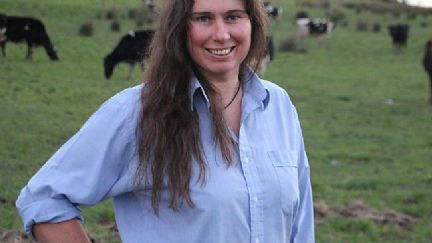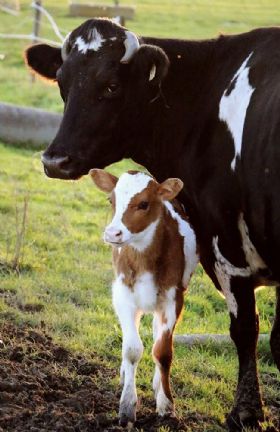| Author |
Topic |
|
|
maryjane
    
7076 Posts
|
 Posted - Sep 22 2014 : 12:28:14 PM Posted - Sep 22 2014 : 12:28:14 PM


|

Author: Sarah Hudson
LOVE to own dairy cows, but don’t want to get up early to milk?
Then Vicki Jones has the answer for you.
Vicki, together with her husband, Rowan, and three children, runs Mountain View Farm dairy across three properties totalling 230ha in Gippsland.
And while the 150-cow business is a little different from the norm — certified organic, with a low stocking rate, entirely grass-fed, with a sideline in dairy cow beef and for now producing unpasteurised bath milk — it is the Jones’ herd-share structure that is unlike any other dairy.
“One day about three years ago I was researching dairies in the US and found the herd-share concept,” Vicki explained. “At the time, we were farming organically, but still supplying conventional processors. I was frustrated with the farmgate price and I wanted to make the most of our product.”
Broadly speaking, the concept sees individuals collectively buy a herd and pay a farmer to manage and care for the cows. Each herd owner is then entitled to a portion of the herd’s produce.
Mountain View Farm has 360 herd sharing families.
For the minimum requirement of four litres a week, a member pays a one-off upfront fee of $120, then $41 a month. If a member wants eight litres a week they pay a one-off upfront fee of $240, then $82 a month. All members are invoiced annually.
Vicki said this compared well given returns for unpasteurised bath milk could be up to $5 a litre.
Milk is transported from the farm to pick-up points in shops within 100km of the farm, around the Mornington Peninsula, Eltham and Hurstbridge.
Vicki said establishing the herd share was no simple task.
“It took me 12 months to get the lawyer’s head around the concept,” she said.
The Joneses have a herd of 150 Jersey-cross cows — “ideal for natural hybrid vigour” — calving three times a year to ensure consistent milk flow.
They use their own bulls — Jerseys, Aussie Reds and more recently an Ayrshire — as well as artificial insemination, and milk in a 40-unit rotary dairy with a small bottling plant on site.
With the family farm across three properties, the dairy is on their main 120ha farm at Mountain View, young stock aged six months to two years are kept on their 70ha Cockatoo farm and the nannies and bobby calves are kept on 40ha at Longwarry North.
It is this Longwarry North property that is another valued sideline to their business, with their own branded beef of 80 cattle.
Retired dairy cows rear male calves that would otherwise be slaughtered at birth.

Calves, (about two a week), aged nine to 15 months or 180kg, are slaughtered at Radfords in Warragul and processed at organic Cherry Tree Organics in Beaconsfield and sold in half a carcass or 10kg packs.
Vicki said while Jersey meat was often considered superior, lean and marbled, dairy cattle didn’t have the same yields as their beef cousins.
“If you put it through a conventional market there’s no money in it, but it works for us because we market and distribute it ourselves,” she said.
“Some people ask us why we do it. In dairying, these calves would be killed as babies as waste product, but at least this way they get the equiv¬alent life to a beef animal.”
Vicki, who grew up on the neighbouring farm to Rowan as a child, bought the Mountain View farm in 2005, initially stocking it with 400 cows and farming conventionally, supplying processors with their milk.
“We were never very good at chemicals and I thought they were really dangerous around the kids,” she says, adding in 2008 they started converting to organic, becoming fully certified this year.
When the drought hit, and then Black Saturday burnt out all their paddocks, the Joneses were forced to reduce stock numbers to 150. It turned out to be a blessing in disguise.
Reduced stocking rates, combined with organics, then reduced their overheads, risk and inputs. And, Vicki swears, grass-fed milk is higher quality, with the herd grazing on nat¬ural pastures of plantain, chicory, dandelion and with crops of pasja, millet, oats and turnip. “We are not chasing production we are chasing quality .”
Yield is about 15 litres of milk per cow per day, with fat up to 4.9 per cent and protein up to 3.6 per cent.
She said because of low stocking rates, being organic and grass-fed, cows had good health.
Vicki said the dairy model has “saved our farm” and her sanity. “If we didn’t do this we would have potentially lost the farm when interest rates hit.
“As a herd share, having that connection has kept me sane. We have created a community around the farm.
“Once a year we run community days where they visit and help us collect fire wood and plant fruit trees.
“They love owning their own piece of the herd.
“When we were conventional dairy farmers I felt so frustrated at being powerless in the industry but now we are price setters and have security. It actually feels like we are running a business.”
From Weekly Times now : http://bit.ly/1paUx3s
|
|
|
Ron
    
4666 Posts
Ronnie
Peever
SD
USA
|
 Posted - Sep 22 2014 : 1:43:40 PM Posted - Sep 22 2014 : 1:43:40 PM


|
| Very nice and great concept. |
With a moo moo here and a moo moo there, here a moo, there a moo, everywhere a moo moo. |
 |
|
| |
Topic |
|
|
|
![[flourish]](/images/flourish-txt_mobius.png)
![[flourish]](/images/flourish-txt_mobius.png)